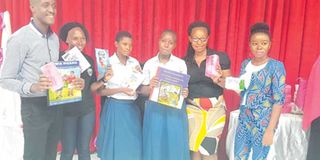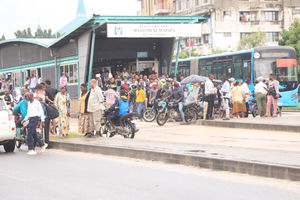When business women come together for a common cause

The period of adolescence is one that’s marked with many biological and social changes. As such, it can be very confusing to a growing teenager who’s experiencing lifetime changes.
Take a minute to reflect on the early years when you entered the adolescent stage.
Do you remember having enough information on what to expect during that time? Do you remember how hard it was for you to cope with the ongoing changes even with lack of enough information on what to expect and do during adolescence?
Generally, there are so many questions during that stage. There are also a lot of struggles both emotional and physical during that time. It is a time when young people need to be equipped with enough information to provide room for them to become responsible adults.
As part of an initiative to support the well being of young girls, a new project, Sauti ya Binti was launched on Tuesday this week at the American corner in Dar es Salaam. The project resulted from a collaboration of five Tanzanian business women with dedicated business models that provide affordable menstrual health options to Tanzanian women/girls, while addressing social and educational concerns.
At the project launch, the acting US ambassador Dr. Inmi Patterson was the guest of honor. She launched a machine called Bela Vendor, a sanitary pad dispenser that dispenses out a piece of pad when a coin is inserted.
Speaking at the launch, Dr Patterson said the US Embassy is supporting the initiative as a way of empowering young girls in education and health care. She said, 82 per cent of girls in Tanzania are not aware of their body changes during this stage.
Adding to that she says, Tanzania is known all over the world for being kind, it is the right time for Tanzanians to be kind to their own girls by supporting them with access to sanitary gears.
Lulu Ameir is one of the team members of the project. She manages the ‘Be A Lady project’ focused on menstrual hygiene management for young girls through the use of sanitary pad dispensers in schools.
Be A Lady won the innovation challenge grant through COSTECH and DLI (Data Lab for Impact). By using research and data, the project was able to conduct the findings from eight schools in Dar es Salaam, focusing on the affordability, availability, and accessibility of sanitary pads.
“The idea came after I saw the plight of the school girls, but it’s not just school girls who go through the menstrual process every month, it can happen to any woman as an emergency while you’re unprepared and don’t have enough money to buy the whole pack. Thus I thought why not install sanitary pads vending machines that dispense the towels at an affordable price,” she says.
The innovation is also advantageous in that it will provide statistical data on how many pads are used per a certain period of time. Such data was insufficient before. So by implementing usage of the machines, it will be easier to keep track on number of pads used in schools and society at large.
The machine cost Sh2million to make. It was made right here in Tanzania. It is easy to operate since you just insert a coin and a pad drops to be collected.
Hyasintha Ntuyeko is another social entrepreneur and founder of Kasole Secrets Company Ltd, which develops bamboo made sanitary napkins which solve menstrual complications for women and girls. In this project of Sauti ya Binti she is the team leader.
She says the project aims to empower 400 adolescent girls from 4 public schools in Dar es Salaam, who are less privileged. These girls are educated on puberty, good menstrual hygiene management and their schools are equipped with learning resources and sanitary pads dispenser machines which will enable girls to easily access reusable or disposable pads at a subsidized amount of Sh200 per pad.
As part of giving back, Hyasintha is running the Hedhi Salama (safe menstruation) campaign, and has pioneered the celebration of International Menstrual Hygiene day at the National level in Tanzania. She has received a number of awards acknowledging her social efforts both nationally and internationally.
On her part, Jennifer Shigoli, who has over four years’ experience in business planning and development, specifically focusing on manufacturing, says the dream to start an initiative came to her mind several years back after she visited a school in Iringa and found a girl who almost missed her mock exams because of lack of proper menstrual hygiene care. “The girl was walking very slowly on her way to school due to pain between her thighs that was a result of using a piece of mattress during her menstruation,” she says.
Jenifer, who is the Chief Executive Officer and Founder of Malkia Investments Company, where she manufactures a global supply of cost-effective reusable sanitary pads branded ELEA, was touched by the girl’s ordeal that she figured she had to do something.
Jennifer is committed to helping women and girls break the barriers that menstruation creates in their lives by providing affordable sanitary care for girls in need, and jobs for local women in Tanzania.
Yusra Hemedi,14, is a Form II student at Jangwani Secondary School. A school that will also benefit from the project. She says she is happy with the project because it will make sanitary pads accessible at a cheaper price, however, she raises concern on whether all students will manage to buy the pads.
She says at her school teachers often share with them different information on adolescent stages and they also talk about menstruation. However she requested for sanitary protection gears because sometimes students help other disabled children to change their pads and there are no gloves.
“At my school we have students with different forms of disabilities. We do not have gloves but we help others who cannot change pads on their own. I wish we could have gloves. All we know is we are helping our friends,” says Yusra.
Another member of the project is Eva Mkane, a 28 year-old youth leader and a campaign manager at MEMA Tanzania, an organization dealing with menstrual hygiene education in rural areas. Currently she is designing and preparing WASH events and activities in 12 areas of the country. She holds a Certificate of secondary school (CSEE) and Certificate in computer technology.
Beatrice Kinemba, also part of the project, works with the Binti Huru initiative as a partner with Elea Pads. Together with Elea Pads they facilitate campaigns and trainings to create awareness on issues related to menstruation, sustainable development goals, and sanitation and hygiene in schools. Beatrice believes in empowering girls and women through the use of reusable pads and capacity building on menstrual hygiene management, reproductive health and behavioral change.
The implementations in schools will start from 24th September 2018 to 20th May 2019. The secondary schools that will benefit with the project are Manzese, Jangwani ( at this school the project will we only focus on girls with disabilities), Tungi and Mikocheni A.
The event also had a panel discussion on the role of community leaders and influencers in improving Menstrual Hygiene Management in Tanzania. The panelists included Rehema Darueshi, a primary teacher who brought teacher’s perspective and is also a Leader of Tanzania League of the blind. Manase Saimon represented Pastor John Jilangila – A religious leader who works on improving the social life standards of believers and students. Yusra as a recipient presented her thoughts on what is needed to be done by the community leaders and influencers to help provide better access to sanitary pads.




